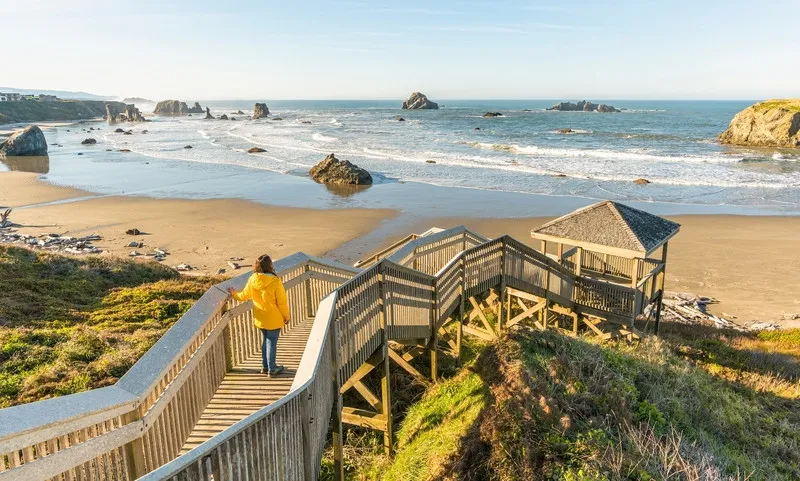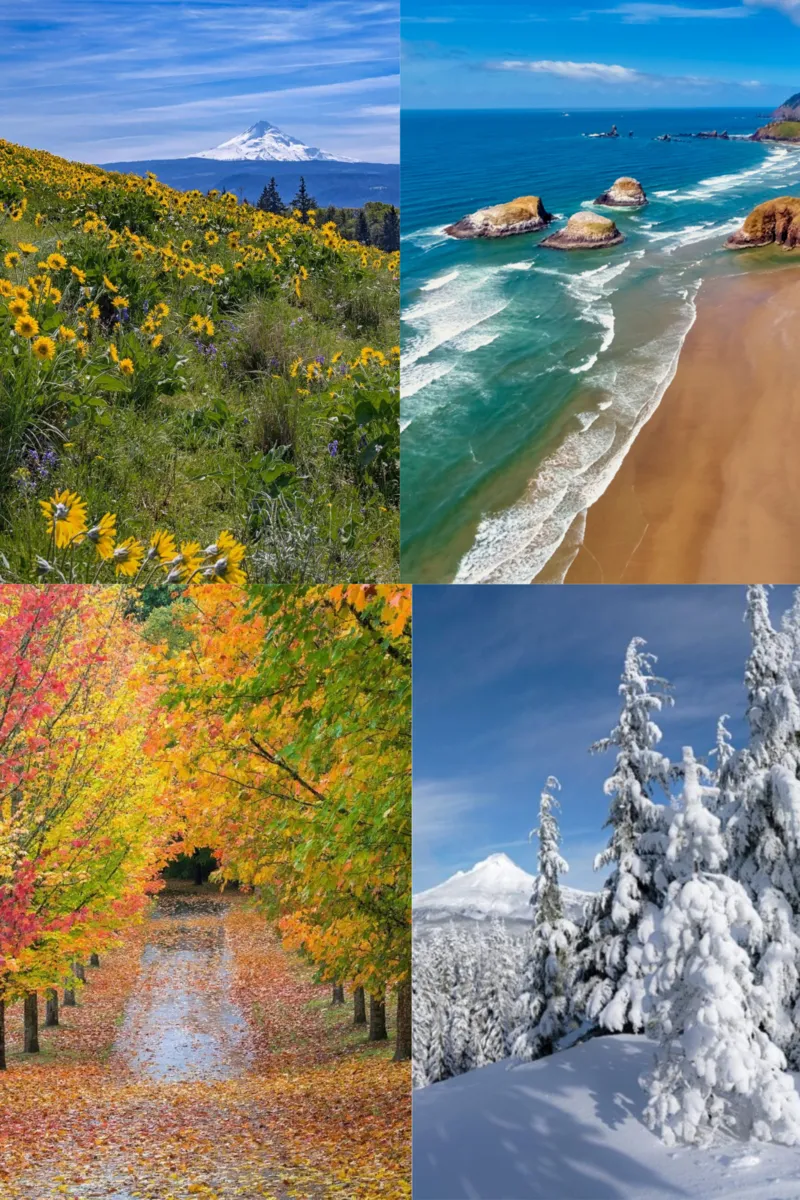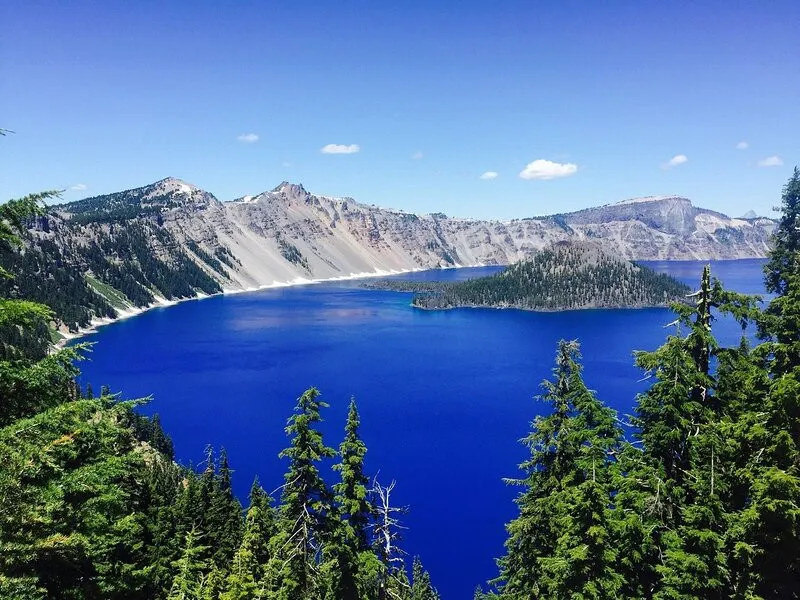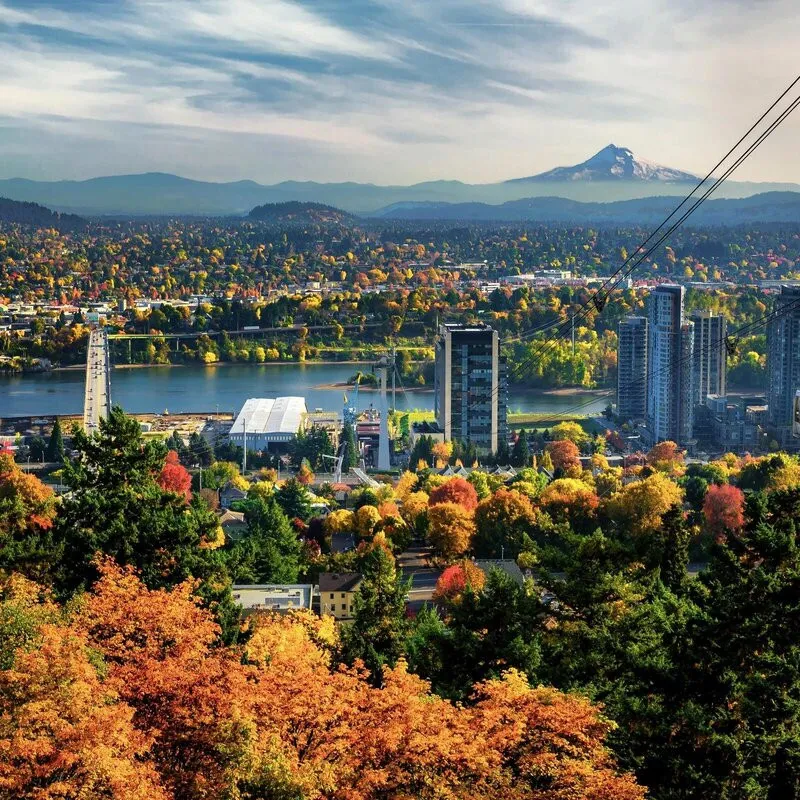Oregon, the gem of the Pacific Northwest, is renowned not only for its magnificent natural beauty but also as a haven for those passionate about free travel and exploration. With breathtaking coastal drives, vast national forests, and crystal-clear lakes, Oregon promises an unforgettable RV camping journey. Are you ready to plan your own memorable adventure?
I. Why Oregon is the Ideal Destination for RV Travel?
Oregon possesses every element to be a dream destination for RV trips. From the rugged Pacific coastline to the majestic Cascade Mountains, Oregon’s diverse landscapes seem tailor-made for exploration in a comfortable RV.
Diverse and Majestic Nature: Oregon is a stunning blend of mountains, sea, forests, and deserts. You can wake up amidst whispering pine forests, drive along the coast to watch the sunrise, or camp by the legendary Crater Lake. This diversity ensures that every day of your journey is a fresh experience.
Developed Camping Infrastructure: Oregon boasts a well-planned system of national parks, state parks, and private campgrounds. These campgrounds are often equipped with full amenities such as restrooms, showers, picnic tables, and waste disposal areas, catering to the needs of RV travelers.
Thriving RV Travel Community: RV travel culture is very popular in the US in general and Oregon in particular. You’ll easily find RV rental shops, support services, and a community of RV enthusiasts ready to share their experiences.
Abundant Outdoor Activities: RV travel in Oregon is more than just moving and camping. You have countless outdoor activity options such as hiking, mountain climbing, kayaking, fishing, biking, surfing, and skiing (in winter).

II. Detailed Planning for Your Oregon RV Trip
For a smooth and memorable trip, detailed planning is crucial. Here are the steps you need to take:
1. Determine the Ideal Time to Visit
The best time for RV travel in Oregon depends on the area you want to explore and the activities you want to enjoy.
- Summer (June – August): Warm, dry weather, ideal for outdoor activities and coastal exploration. However, this is also peak tourist season, campgrounds are often crowded, and RV rental prices may be higher.
- Fall (September – November): Cool, pleasant weather, vibrant autumn foliage. Tourist numbers decrease, creating a quieter atmosphere. This is a great time for hiking and leaf-peeping.
- Spring (March – May): Weather starts to warm up, flowers bloom, and nature is fresh. Spring is suitable for those who want to avoid crowds and enjoy peaceful nature.
- Winter (December – February): Snowfall in the mountains, suitable for skiing. The coast can experience rain and strong winds. If you want to experience winter camping, prepare carefully and choose campgrounds with suitable amenities.

2. Choose and Rent an RV
There are various types of RVs, from compact campervans to large motorhomes. Choosing the right type depends on the number of people traveling, your budget, and your amenity needs.
- Campervan (Class B): Compact size, easy to drive and fuel-efficient. Suitable for couples or small families.
- Travel Trailer: Rental prices are usually cheaper than motorhomes, spacious interior. Requires a specialized tow vehicle and towing skills.
- Motorhome (Class A, Class C): Fully equipped like a mobile home, spacious interior. Suitable for large families or groups of friends.
Where to rent an RV?
- Large RV rental companies: Cruise America, RVshare, Outdoorsy are popular choices with many RV types and rental locations.
- Local RV rental companies in Oregon: Search on Google Maps with the keyword “RV rental Oregon” to find options near you.
Things to note when renting an RV:
- Book in advance: Especially during peak season, book several months in advance to ensure you get your desired RV.
- Carefully review the rental agreement: Read the terms and conditions regarding insurance, mileage limits, cancellation policies, and any additional fees.
- Inspect the RV before pickup: Ensure all equipment is working properly and the RV is free of damage.
3. Plan Your Itinerary and Book Campsites
Oregon has countless attractive destinations for RV travel. Here are a few suggestions:
- Oregon Coast: Over 300 miles of scenic coastline with stunning beaches, dramatic cliffs, charming coastal towns, and historic lighthouses. Popular stops: Cannon Beach, Seaside, Newport, Florence, Samuel H. Boardman State Scenic Corridor.
- Crater Lake National Park: The deepest lake in the United States with deep blue waters and majestic mountain scenery.
- Mount Hood National Forest: Mountainous area with Mount Hood, Oregon’s highest peak, serene Trillium Lake, and numerous hiking trails.
- Redwood National Park: (Located in California, near the Oregon border) Admire giant redwood trees and explore the unique coastal forest ecosystem.
- Bend and Central Oregon: High desert region with volcanoes, the Deschutes River, lava caves, and outdoor activities like rock climbing, biking, and boating.
Booking campsites:
- National and State Parks: Book in advance through Recreation.gov (for national parks) or Oregon State Parks (for state parks). Popular campsites often fill up quickly, especially in summer.
- Private Campgrounds: Use apps like Campendium, The Dyrt, or Allstays to find and book private campgrounds.

4. Prepare Essential Supplies
- Personal Items: Weather-appropriate clothing, toiletries, sunscreen, medications.
- Camping Gear: Folding tables and chairs, flashlights, camping stove, cooking utensils, dishes, sleeping bags, tent (if needed), water bottles, cooler.
- RV Supplies: Electrical cords, water hoses, RV-specific toilet paper, deodorizing chemicals for portable toilets.
- Maps and Navigation Devices: Even with GPS, paper maps are still useful in areas with weak signal.
- Basic Car Repair Kit: In case of minor vehicle issues on the road.
- Entertainment Devices: Books, games, speakers, camera.
5. Understand Rules and Regulations
- Driver’s License: Ensure you have a valid driver’s license suitable for the type of RV you are renting.
- Traffic Laws: Learn about traffic laws in Oregon, especially regulations related to RVs (speed limits, parking, etc.).
- Camping Regulations: Each campground has its own rules about hours, campfires, waste disposal, etc. Read and comply carefully.
- Permits and Fees: Some areas may require special permits or entrance fees. Research beforehand to prepare.
III. Suggested 7-Day Oregon RV Itinerary
Here is a suggested 7-day itinerary to explore the highlights of Oregon by RV:
Days 1-2: Portland and Columbia River Gorge
- Arrive in Portland, pick up your RV, and explore the city: Portland Japanese Garden, Washington Park, Pearl District.
- Drive along the Historic Columbia River Highway, stopping at Multnomah Falls, Bridal Veil Falls, and admire the majestic gorge scenery.
- Camp in the Columbia River Gorge area.

Days 3-4: Oregon Coast
- Drive towards the coast, starting from Seaside or Cannon Beach.
- Stop at Haystack Rock in Cannon Beach, Yaquina Head Lighthouse, and explore the town of Newport.
- Continue south, enjoying the views of Samuel H. Boardman State Scenic Corridor and coastal cliffs.
- Camp at one of the campgrounds along the coast.
Days 5-6: Crater Lake National Park
- Drive to Crater Lake National Park.
- Explore Rim Village, hike around the caldera, admire Crater Lake from various viewpoints.
- Take a boat tour on the lake (weather permitting).
- Camp inside the national park or nearby areas.
Day 7: Bend and Central Oregon
- Drive to Bend, explore the city and Central Oregon region.
- Visit Pilot Butte State Scenic Viewpoint, High Desert Museum and Science Center.
- If time allows, visit Newberry National Volcanic Monument or Deschutes National Forest.
- Return the RV and end your journey.
This itinerary can be adjusted to your preferences and time. You can spend more time at each destination or explore other areas of Oregon.
IV. Useful Tips for Your Oregon RV Trip
- Drive slowly and carefully: Especially on coastal and mountain roads, drive slowly, maintain a safe distance, and pay attention to observation.
- Conserve water and electricity: Water and electricity on RVs are limited, use them sparingly, and refill water tanks and charge batteries whenever you have the opportunity.
- Dispose of waste properly: Do not litter, use public trash cans or take waste to a place where it can be disposed of.
- Respect nature: Do not harm the environment, do not pick flowers or break branches, do not disturb wildlife.
- Prepare for all types of weather: Oregon weather can be unpredictable, prepare clothing and gear suitable for sun, rain, and cold.
- Enjoy every moment: RV travel is an opportunity to relax, immerse yourself in nature, and create unforgettable memories. Enjoy every moment of your journey!
With thorough preparation and a spirit of adventure, your RV trip in Oregon is sure to be a wonderful and unforgettable experience. Let’s hit the road and explore the wild and majestic beauty of this state!